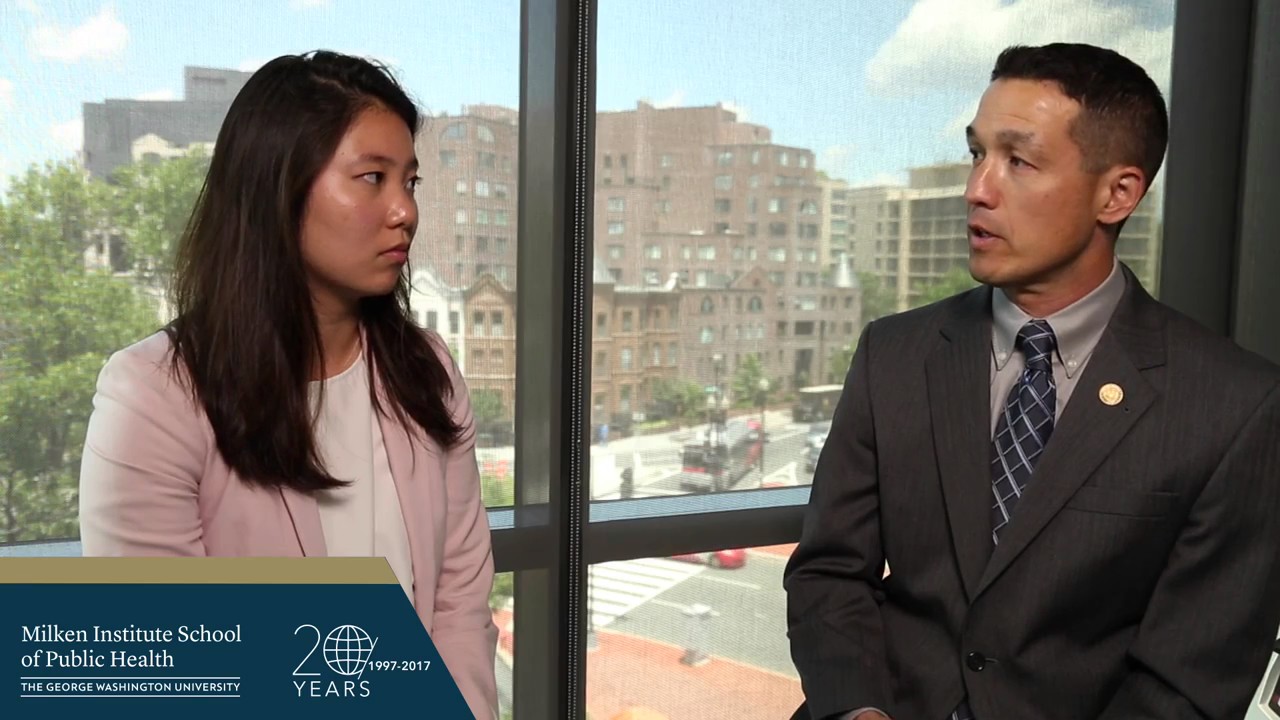A recent Milken Institute School of Public Health seminar featured Lieutenant Colonel (LTC) Victor Suarez, who has been embedded in the Department of Environmental and Occupational Health (EOH) as a U.S. Army War College Fellow this year. In his talk, “Optimizing Health Readiness of the Force Requires an Effective, Relevant, and Modern Strategy,” LTC Suarez described research he conducted while serving as a Fellow that is now getting attention on Capitol Hill.
LTC Suarez’ goal as a Fellow was to find ways to improve the military’s health readiness by better addressing service members’ high levels of smoking and obesity, as well as the growing demand for disability claims, mostly for preventable chronic diseases and musculoskeletal injuries. While here, he took a full load of classes offered by many of the Milken Institute School of Public Health’s six departments. He also studied several civilian employers’ most successful programs for encouraging health and well-being and amassed data and proven practices that the military may be able to use to boost readiness and lessen the demands on the defense budget. He has been presenting several new strategic approaches that he discussed at the seminar to a wide audience of stakeholders and leaders—in addition to the dozens who attended his seminar in person and online—including members of the military and legislators on Capitol Hill.
One of the reasons that LTC Suarez’ ideas have been getting attention is because the Fiscal 2017 National Defense Authorization Act (NDAA) could allow the military to implement some of his research recommendations. His findings and recommendations include implementing a prevention-focused annual health risk assessment (HRA) in addition to the treatment-focused annual periodic health assessment currently in use. He also argues for promoting health and well-being among service members by implementing proven programs which develop self-efficacy and mastery of critical health-producing behaviors (nutrition, exercise, sleep, etc.) that are tailored for individuals based on their health status and their stage of change behavior. In addition, he advocates for all branches of the military services to continue to invest in base infrastructures which promote active living and access to healthy food, and incentives which can help reinforce and reward healthy behaviors. He believes that such a comprehensive approach—as seen among the best corporate health and well-being programs--could go beyond improving service members’ military readiness, and enhance their health, well-being and quality of life for the rest of their lives.
During his time at the school, in addition to working with EOH under the guidance of Associate Professor Peter LaPuma, LTC Suarez connected with William (Bill) Dietz, chair of the Milken Institute SPH’s Sumner M. Redstone Global Center for Prevention and Wellness.
After the seminar, Pei-Ying Chang, an MPH student in the department’s Environmental Health Science and Policy program, asked LTC Suarez about a number of the important points he raised in the seminar. You can listen to his answers in this recording on the EOH Department’s Youtube Channel. In addition to her studies, Chang serves as a graduate research assistant in the school’s Antibiotic Resistance Action Center. She recently completed an internship at the White House Office of Science and Technology Policy and plans to go on to medical school to study military medicine.
The department brings in one or two experts each month to discuss their research, and these seminars are one of the ways our students learn about current EOH topics. LTC Suarez is the department’s second Army War College Fellow, and a new fellow will be joining the department this coming Fall 2017.


